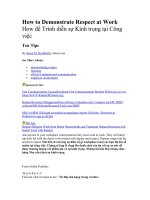Emotional Intelligence at Work pdf
Bạn đang xem bản rút gọn của tài liệu. Xem và tải ngay bản đầy đủ của tài liệu tại đây (1.1 MB, 237 trang )
Emotional Intelligence at Work
Emotional Intelligence at Work
A Professional Guide
(Third Edition)
Dalip Singh
Response Books
A division of Sage Publications
New Delhi/Thousand Oaks/London
Copyright © Dalip Singh, 2006, 2003, 2001
All rights reserved. No part of this book may be reproduced or utilised in any form or
by any means, electronic or mechanical, including photocopying, recording, or by any
information storage or retrieval system, without permission in writing from the publisher.
First published in 2001
Second revised edition published in 2003
Third revised edition published in 2006 by
Response Books
A division of Sage Publications India Pvt Ltd
B-42, Panchsheel Enclave
New Delhi 110 017
Sage Publications Inc Sage Publications Ltd
2455 Teller Road 1 Oliver’s Yard, 55 City Road
Thousand Oaks, California 91320 London EC1Y 1SP
Published by Tejeshwar Singh for Response Books, Laser typeset in 11/13 points ACaslon
Regular by Excellent Laser Typesetters, Delhi, and printed at Chaman Enterprises,
New Delhi.
Library of Congress Cataloging-in-Publication Data
Singh, Dalip, 1956–
Emotional intelligence at work: a professional guide/Dalip Singh. — 3rd ed.
p. cm.
Includes bibliographical references and index.
1. Psychology, Industrial. 2. Emotional intelligence. I. Title.
HF5548.8.S526 158.7—dc22 2006 2006030036
ISBN: 10: 0–7619–3532–0 (PB) 10: 81–7829–688–8 (India-PB)
13: 978–0–7619–3532–2 (PB) 13: 978–81–7829–688–3 (India-PB)
Production Team: Roopa Sharma, Mathew P.J. and Santosh Rawat
for
Jogi
Contents
List of Tables and Figures 9
Preface to the Third Revised Edition 11
Preface to the Second Revised Edition 13
Preface to the First Edition 15
1. Emotional Intelligence: The Concept 19
Introduction
o
EQ makes a Difference in Life
o
What Exactly is EQ?
o
Are You Emotionally Intelligent?
o
How Do You Acquire Your EQ?
o
EQ Helps in
Professional Success
o
Some Myths about EQ
2. Emotional Intelligence and Your Personality 51
The Relationship between EQ and IQ
o
Where Do
Emotions Come From?
o
Consequences of Low and
High EQ
3. Can EQ be Developed? 59
Early Life Experiences
o
EQ Develops with Maturity
o
A Case Study
o
Emotions can be Unlearned
o
Examples
of EQ Development
4. Emotional Skills that Managers should Learn 73
Learn to Recognise Your Emotions
o
Learn to Empathise
with Others
o
Develop High Self-esteem
o
Manage
Emotional Upsets
o
Be an Emotional ‘Winner’
o
Learn
the Art of Influencing People
o
Manage Your Anger
o
Other Related Areas
5. Emotional Intelligence: The Empirical Evidence 103
Defining Emotional Intelligence
o
Levels of EQ Required
for Various Jobs
o
Emotional Intelligence Competencies
8 EMOTIONAL INTELLIGENCE AT WORK
o
EQ in the Indian Perspective
o
Do Different Professions
Require Different Levels of EQ?
o
Emotional Intelligence
of IAS Officers
o
Emotional Intelligence and Leadership
Behaviour
o
Relation between EQ and IQ among
Adolescents
o
EQ and Managerial Effectiveness: An
International Study
o
EQ and Well-being of Adolescents
o
The Soft Art of being a Tough Leader
o
Emotional
Intelligence and Stress Management
o
Managing Human
Capital: An EQ Perspective
o
The Making of an EQ
Test
o
Other Research Studies
6. Guidelines for Training and Development 192
Phase One: Preparation for Change
o
Phase Two: Training
o
Phase Three: Transfer and Maintenance
o
Phase Four:
Evaluating Change
7. Know Your EQ: Emotional Quotient Test 210
The EQ Test (Developed by N.K. Chadha
and Dalip Singh)
References and Select Bibliography 223
Index 226
About the Author 236
List of Tables and Figures
Tables
1.1 Traditionalists versus Modernists 28
2.1 Consequences of Levels of EQ 57
5.1 Level of EQ Required for Various Jobs 114
5.2 Framework of Emotional Competencies 116
5.3 Study on Postgraduate and Undergraduate
Students 126
5.4 Frequency of Response 127
5.5 The Results 135
5.6 Clusters and Professions 136
5.7 Mean and Standard Deviation (N = 60)
on the Variable of Emotional Intelligence 143
5.8 Comparison between Group I and
Group II IAS Officers 143
5.9 EQ Level of IAS Officers 143
5.10 Means, SDs and Intercorrelations (N = 150) 167
5.11 Means, SDs and F-ratios 173
5.12 Summary of Stepwise Discriminator Analysis 175
Figures
1.1 Indicator of a Person’s Success in Life 26
1.2 The Personality 33
1.3 The Individual 39
1.4 EQ Gets You Promoted! 44
10 EMOTIONAL INTELLIGENCE AT WORK
2.1 The Human Mind 54
5.1 Dimensions of Emotional Intelligence 127
5.2 Defining Emotional Intelligence 128
5.3 Professions 137
5.4 EQ Level 144
5.5 Comparison of Four Groups on the
Variable ‘Emotional Intelligence’ 160
5.6 Comparison of Four Groups on the
Variable ‘Managerial Effectiveness’ 162
Preface to the Third Revised Edition
It is a matter of immense satisfaction for me that the first and
second editions of the book were bestsellers. This has motivated
me to bring the third revised and thoroughly refreshed edition
before the readers. The concept of emotional intelligence or
emotional quotient (EQ) has also gained popularity and accep-
tance over the years. How well do you connect with yourself and
with others? Your ability to appropriately identify, recognise and
manage your emotions for your own well-being as well as the well-
being of people around you is what is described as emotional
intelligence. Your emotional sensitivity, maturity and competency
is what ultimately decides your destiny. Can you recognise your
emotions and control them to your advantage, can you make out
how your behaviour is affecting the people around you? Do you
know how to handle stress, frustration, anxiety and conflict? Can
you make out the most out of the situations whether good or bad?
The third edition tends to answer some of the questions: What
is emotional intelligence? What does it look like? What are it’s
different components, and how are they related? How is it differ-
ent from other concepts? In what ways and to what extent do
improvements in emotional intelligence enhance individual, group
and organisational performance? You will find answers to all the
above in this revised and re-researched book.
An important objective of this edition is to promote high-
quality research on the application of emotional intelligence in
organisations. In order to advance this objective, practical appli-
cations of EQ in organisations have been given in this edition.
This book has all the answers to the situations you may have
be pondering over in the recent past. This book will help you to
12 EMOTIONAL INTELLIGENCE AT WORK
know what emotional intelligence is, specific areas in which EQ
may be applied, specific recommendations about how to develop
your EQ and what skills you should master to be emotionally
intelligent. The practical aspect of the third edition is that you will
discover what your current level of EQ is and what you can do
to further develop it. I hope the book contributes in upgrading the
EQ of individuals, organisations and the society as a whole and
lead to the betterment of mankind.
The Website on the book www.eqindia.com has also been very
popular. It attracted hundreds of visitors from all over the globe,
who attempted online EQ test. The data so compiled has further
been used to define emotional intelligence.
I would like to place on record my gratitude to Professor N.K.
Chadha, University of Delhi, for his heartfelt involvement in my
research work.
Chandigarh, India D
ALIP SINGH
2006
Preface to the Second Revised Edition
The workplace is not the right place for emotions—that was the
conventional wisdom. Emotions were disruptive and had to be
reined in, buttoned up and locked away. If they were turned loose,
it would wreck the discipline in organisations and the carefully
crafted order that had been nurtured over the years.
However, the growing body of research in the US on emotional
intelligence and emotional quotient (EQ) in the mid-eighties has
turned the tide, making organisations and the people who work
there less wary of dealing with emotions.
Funnily enough, Indians who deal with a variety of emotions
in their daily lives seem to zipper up their emotive side as soon
as they enter their workplaces. This is prompted by the mistaken
notion that work is serious business and any display of emotion
ought to be regarded with extreme suspicion.
This revised edition is indicative of two things: first, that at-
titudes in Indian organisations are beginning to change and
managers are no longer sidling down corporate corridors afraid to
tread on someone’s ‘emotive’ corns; second, there have been a lot
of fast-paced developments in this field since the first edition of
this book came out just over a year ago.
There has been tremendous interest in the subject in univer-
sities, the business world, and among the general public. The book
itself has done good business in India, Europe and America, which
is pretty gratifying. A number of doctoral studies have also been
carried out in the field signifying its value in the academic world.
This revised edition gives the book a distinctive Indian orien-
tation. To start with I have evolved an Indian definition of emo-
tional intelligence based on the extensive research I have carried
14 EMOTIONAL INTELLIGENCE AT WORK
out in industry and elsewhere. My model of emotional intelligence
consists of three major dimensions emotional competence, emo-
tional maturity and emotional sensitivity. Based on these dimen-
sions, I have defined emotional intelligence as ‘the ability of an
individual to appropriately and successfully respond to a variety
of emotional stimuli elicited from the inner self and the immediate
environment. Emotional intelligence constitutes these three psy-
chological dimensions which motivate an individual to recognise
truthfully, interpret honestly and handle tactfully the dynamics of
human behaviour.’
The definition captures the Indian psyche and I am sure that
it will be of immense use to Indian researchers, corporates and the
general public.
In the revised edition, I have incorporated two new chapters—
one containing the latest Indian research in the field and the other
drawing lessons for the modern-day manager from the Bhagvad
Gita. While we are looking at the exciting developments in the
field, I have tried to ensure that we do not lose sight of the body
of wisdom in our ancient sacred texts. This will help a manager
deal with emotional conflict, troubleshooting, stress and burnout
situations in everyday life.
I am sure that the fresh contents will be appreciated by the
readers and will also lead to quality research in this field.
Chandigarh, India D
ALIP SINGH
2003
Preface to the First Edition
What determines professional success? Is it primarily your intel-
ligence level or intelligence quotient (IQ), or is it your personality
characteristics, or is it a combination of several things? I have
pondered over this question for several years without arriving at
a convincing answer. According to the proponents of emotional
intelligence (EQ), a person’s emotional make-up largely deter-
mines his or her professional success. They believe that EQ is the
most important determinant of the extent of professional and
personal success in life. It is interesting to note that so many people
with high IQ fail whereas those with less intellectual endowment
are extremely successful. Even in certain renowned business estab-
lishments, where people are trained to be smart, the most valued
and productive managers are those who have a high emotional
intelligence level, and not necessarily those with the highest IQ.
Such examples abound in business, politics, academia and admin-
istration. It is increasingly recognised that IQ may account for only
about 20 per cent of a person’s success in life. The remaining
80 per cent depends largely on a person’s emotional intelligence,
i.e., EQ.
The leitmotif of this book is that the rules for work are con-
stantly changing. People are being judged by a new yardstick: how
well they are able to handle themselves and others and not merely
in terms of their academic qualifications and expertise. This yard-
stick is increasingly being applied to decisions regarding the hiring
and firing of employees, who will be retained and who will be
sidelined and who will be promoted. It is said that in the corporate
world a person is recruited on the basis of his or her IQ, but is
promoted on the grounds of his or her EQ. These new rules
16 EMOTIONAL INTELLIGENCE AT WORK
predict who is most likely to become a successful manager and who
is most prone to failure. Whatever a person’s vocation, he or she
is being measured for traits which are crucial to his or her future
marketability.
These rules have little to do with what you were taught as
important in school and college. The new measures take it for
granted that you have the requisite IQ and technical know-how
to do your job: it focuses instead on personal qualities, such as
initiative and empathy, motivation and awareness, all of which
constitute EQ.
Simply put, EQ denotes ‘Emotional Quotient’ and is used
interchangeably with ‘Emotional Intelligence’, a term derived from
‘Intelligence Quotient’ (IQ). In a layperson’s language this could
be defined as knowing what feels good, what feels bad, and how
to get from bad to good. A more formal academic definition refers
to emotional awareness and emotional management skills, which
enable you to balance emotion and reason so as to maximise your
long-term happiness. Emotional intelligence includes qualities
such as self-awareness, ability to manage moods, motivation, em-
pathy and social skills like cooperation and leadership.
Your level of emotional intelligence is neither genetically fixed,
nor does it develop only in early childhood. Unlike IQ, which does
not increase after adolescence, emotional intelligence is largely
learned and continues to develop throughout life and is condi-
tioned by life’s experiences. Unlike IQ, emotional intelligence can
be improved throughout life. In the normal course of a lifetime,
emotional intelligence tends to increase as you learn to be more
aware of your moods, to effectively handle distressing emotions,
and to listen and empathise. In short, as you become more mature,
you can acquire certain emotional competencies that lead to out-
standing performance at work.
Some of the negative emotions which require emotional man-
agement and regulation are anger, failure, fear, disappointment,
frustration, obligation, guilt, resentment, emptiness, bitterness,
dependence, depression, loneliness and lethargy. Similarly, posit-
ive emotions such as motivation, appreciation, friendship, self-
control, satisfaction, freedom, fulfilment, autonomy, peace, desire,
PREFACE TO THE FIRST EDITION 17
awareness, contentment, elation and happiness can be used effec-
tively as and when the situation demands.
Why is it necessary to develop EQ? The reason is that people
with high EQ are happier, healthier and more successful in their
relationships. These people strike a balance between emotion and
reason, are aware of their own feelings, show empathy and com-
passion for others, and have high self-esteem. Emotional intelli-
gence can be instrumental in many situations in the workplace and
can help achieve organisational effectiveness. On the basis of
advanced research on the requirements of a CEO’s office, psy-
chologists concluded that in the fast-changing corporate environ-
ment you need more than just brains to run your business. You also
need high EQ for making the right decisions and solving prob-
lems. Some of the immediate benefits of high EQ are that it can
lead to increased productivity, enhanced leadership skills, im-
proved responsiveness and greater creativity. It can also create an
enthusiastic work environment, reduce stress levels and resolve
emotional issues, improve the well-being of employees and im-
prove relationships all round. EQ can enable employees to resolve
past issues and both external as well as internal conflicts, help them
attain emotional power and accomplish their goals at all levels
physical, mental, emotional and spiritual and improve psychologi-
cal abilities such as memory, clarity of thinking and decision-
making.
Increasingly, more companies are realising that encouraging
emotional intelligence skills is a vital component of their manage-
ment philosophy. An organisation does not compete with products
alone: how well it uses its people is more important for its survival.
The Consortium for Research on Emotional Intelligence in
Organisations has illustrated how emotional intelligence contrib-
utes to the bottom line in any work organisation. EQ can be a
valuable tool for HR practitioners and managers who need to
bring about changes in their own organisations. It is being increas-
ingly recognised that EQ can be effectively applied to the unique
requirements of any organisation. The principles of EQ can help
employees become better team players, show greater creativity in
their work and increase overall productivity through the powerful
18 EMOTIONAL INTELLIGENCE AT WORK
techniques of integrating and applying emotional intelligence at
the workplace. For example, learning how to successfully overcome
obstacles and blocks, resolve conflicts and deal with any issue that
may come in the way of accomplishing managerial objectives.
What are the ramifications of EQ for a professional? Clearly,
in any discussion of emotional intelligence, it is important to
identify the key determinants of success in the workplace. Even
more important is the basis on which you form your personal
compass, both at the workplace and elsewhere. Having been ex-
posed to the psychological aspects of EQ, readers would want
to assess their own EQ level. To help readers measure their
EQ ‘Emotional Intelligence Test’, standardised and developed
by Professor N.K. Chadha of the University of Delhi, has been
included in the book. I am sure that readers will find it informative
and interesting.
This work could not have been completed without the active
support of a large number of friends and well-wishers. It is not
possible to name them all and acknowledge their contribution
individually. However, I am particularly grateful to Professor N.K.
Chadha, Payal Mehta, Professor John Van Willigen of Kentucky
University, Professors H.C. Ganguli, N.R. Chatterjee, V.K. Bhalla
of the University of Delhi, and Ravi Bangar, S.P. Mahi and Satish
Parashar, to name just a few.
It is my fervent hope that the book will lead to improved
interpersonal relations at the workplace, within the family and
elsewhere.
D
ALIP SINGH
For the sake of clarity the terms emotional intelligence (EI) and emotional quotient
(EQ) will be used interchangeably throughout the book.
Emotional Intelligence: The Concept
Anyone can be angrythat is easy. But to be angry with the right
person, to the right degree, at the right time, for the right purpose,
and in the right waythat is not easy.
Aristotle
INTRODUCTION
What do love, happiness, fear, affection, hate, shame, disgust,
surprise, sadness, elation and anger have in common? These are
emotions that directly affect your day-to-day life. For long, it has
been believed that success at the workplace depends on your level
of intelligence or intelligence quotient (IQ) as reflected in your
academic achievements, exams passed, marks obtained, and so
on. In other words, your intellectual credentials are: doing well in
school, holding an engineering degree or even an advanced com-
puter degree, obtaining high scores in an IQ test. All these are
instances of intelligence of the academic variety. But how smart
are you outside the classroom, faced with life’s difficult moments?
Here, you need a different kind of resourcefulness. You need, what
is called, emotional intelligence or emotional quotient (EQ), which
is a different way of being smart.
Why is it that the smartest people are not always the wealthiest,
and why are some people instantly liked upon introduction, while
1
20 EMOTIONAL INTELLIGENCE AT WORK
others are distrusted? Why are some people sympathetic and
caring, and have a rich and fulfilling emotional life? Why are some
people comfortable with themselves and the social universe they
inhabit, while many others are not? Why do some people, with
less academic achievements, lead a fulfilling life, whereas many
people with high IQ, make their own life, and those of people
around them, miserable?
Emotional intelligence is what gives a person the competitive
edge. Even in certain renowned business establishments, where
everyone is trained to be smart, the most valued and productive
managers are those who have strong traits of emotional intelli-
gence. Being endowed with great intellectual abilities, you may
become a brilliant fiscal analyst or a legal scholar, but a highly
developed emotional intelligence is what will make you a candi-
date for a CEO, a brilliant trial lawyer, a successful politician or
a powerful bureaucrat. Your EQ constitutes factors that are most
likely to ensure success in your marriage or your love affair, or that
you attain dizzy heights in your business. The lack of emotional
intelligence explains why people who, despite having a high IQ,
have been failures in their personal and professional lives.
Today, the rules of the workplace are rapidly changing; a new
yardstick is being used to judge people. It is often said that a high
IQ may assure you a top position, but it may not make you a top
person. This does not measure how smart you are or what your
academic qualifications are or even what your expertise is. Instead,
it measures how well you are able to handle yourself and others.
This yardstick is increasingly applied in deciding who will be hired
and who will not, who will be dismissed and who will be retained,
who will be ignored and who will be promoted. These new rules
predict who is most likely to be successful and who is most likely
to fail. Regardless of the field you are currently working in, you
are being judged for emotional traits that are crucial to your
marketability for future jobs or new assignments. Possibly, em-
ployees of large organisations may be evaluated in terms of such
abilities, even though they may not be aware of it. If you are
applying for a job, you are likely to be assessed in terms of these
emotional abilities, though no one will tell you so explicitly.
EMOTIONAL INTELLIGENCE: THE CONCEPT 21
Whatever the job, understanding how to cultivate these abilities
is essential for a successful career.
These emotional traits have little to do with what you were told
was important in school, college or other institutions; academic
abilities are largely irrelevant to these new standards. Today, it is
taken for granted that you have adequate IQ, that is, the intellec-
tual ability and the technical know-how to do your job. The focus,
instead, is on your EQ—personal qualities such as initiative,
empathy, motivation and leadership. To illustrate this point fur-
ther, it may be said that people involved in the same profession
generally fall above a certain threshold of intelligence or IQ. For
example, few physicians are of average intelligence since they must
have an IQ above a certain level to make it through medical
college. Some managers are smarter than others. But none are
dumb. This is where the question arises of how to differentiate
between managers who have more or less similar levels of IQ. It
is here that EQ becomes important for it sets apart people with
similar IQs. This is neither a passing fad nor a temporary man-
agement credo. Data obtained from studies of working people
confirm that emotional capabilities need to be taken seriously in
order to be a star performer. At a time when there are no guarantees
of job security and when the very concept of a ‘job’ is being rapidly
replaced by ‘portable skills’ or ‘marketable skills’, EQ is considered
as the prime factor which makes and keeps people employable.
Although these ‘intelligent’ qualities have for decades been re-
ferred to by various names—from ‘smartness’ and ‘personality’ to
‘soft skills’ and ‘competence’—it is only now that there is a precise
understanding of these emotional abilities and a new name given
to it: emotional intelligence or emotional quotient (EQ).
If you work for a small organisation or are self-employed, your
ability to perform at your peak may depend to a large extent on
your having these emotional abilities, though these were definitely
not taught at school or college. Even so, your career will depend
to a greater or lesser extent on how well you are able to master these
abilities. If you are working for a large organisation, you have to
see if your organisation fosters such competencies or discourages
them. The effectiveness and productivity of the organisation will
22 EMOTIONAL INTELLIGENCE AT WORK
depend upon the degree of acceptance of these emotional com-
petencies.
In the 1970s and 1980s, people got ahead by attending the
‘right’ schools and performing ‘well’ in written exams or compe-
titions. Today, the world has thousands of well-trained, promising
men and women who have reached their plateau or, worse, have
failed because of crucial gaps in their emotional competencies.
Today, for a new entry-level employee, specific technical skills are
less important than an underlying ability to learn on the job. You
need ‘marketable skills’ in addition to your academic achievements.
The qualities which are considered crucial by employers these days
are many: listening and verbal communication, adaptability and
creative responses to setbacks and obstacles, personal manage-
ment, confidence, motivation to work towards goals, a sense of
wanting to develop one’s career and taking pride in accomplish-
ments, group and inter-personal effectiveness, co-operation and
teamwork, skills in solving disagreements, willingness to make a
contribution, leadership potential, along with competencies in
reading, writing and mathematics. Of these desirable traits, only
reading, writing and mathematics are academic skills. All the
others are related to the non-academic arena—to emotional in-
telligence. What corporations now seek in the new entrants they
hire are EQ qualities.
Let us see some illustrations to better understand this: ‘I had
the lowest grade point average ever in my school,’ says a senior
army officer. ‘But when I joined the army I was graded number
one by my superiors. It was all about how you handled yourself,
got along with people, worked in teams, motivated others, inspired
leadership, and so on. And I found this to be true at the workplace.’
According to a senior civil servant, ‘Too many young officers can’t
take criticism. They are too sensitive and have a fragile ego. They
get defensive or hostile when seniors give them feedback on how
they are doing. They react to performance feedback as though it
were a personal attack.’
If the answer is ‘no’ to one or more of these questions, your
problem has been diagnosed. You are a normal, average, thinking
person trained by family, school and workplace to value IQ (the
EMOTIONAL INTELLIGENCE: THE CONCEPT 23
head) and devalue EQ (the heart). You have learned to suppress
your feelings, emotions and passions, and use your head rather
than your heart to find out what
your body feels and wants. In
short, you use your IQ, and not
EQ, to solve your problems. It
is not possible to feel comfort-
able at the workplace if you are not comfortable in your own skin.
Once you have learned to accept your emotional self, every facet
of your work life will benefit. You may have noticed that the price
you pay for ignoring your emotions is far too high. The cost is
depriving yourself of the emotional skills you need for a healthy,
satisfying and fulfilling life. Your IQ may help you in understand-
ing and dealing with the world at one level, but you need emotions
to understand and deal with yourself and, in turn, with others. It
is not possible to get along well with others, and get ahead in the
world regardless of how ‘academically smart’ you are, if you are
unaware of your emotions and not able to recognise and value
them, and act honestly with them. In short, you are often simply
at sea, out of touch with your sense of self. Feeling your emotions
is certainly not a sign of weakness. You follow strict rules on how,
when, where and how much you should allow yourself to express
+ Before you move ahead, answer a
few simple questions:
l Do you assess your personal and professional life at the moment
as satisfactory?
l Have you achieved all your expected goals?
l Are you content with the number of friends you have and the
depth of your friendships?
l Is your marriage the fountain of intimacy and support you
dreamed it would be?
l Have you been promoted with the readiness and speed you
deserved at work?
l Do you generally feel at ease with the world or a little out of
place?
It is not possible to feel
comfortable at the workplace if
you are not comfortable in your
own skin.
24 EMOTIONAL INTELLIGENCE AT WORK
emotions because you have been told to do so. If you cry, you do
not do so in front of others. When you are angry, you bite your
tongue. When you are hurt, you force a smile. Unfortunately,
however, such actions backfire. It is healthy for the mind, body,
heart and spirit to experience emotions when they arise. Otherwise
emotions can be self-destructive. Most strong emotions do not last
long at all. If you do not suppress your emotions, you will have
a clear head, a contented heart, and greater self-control. If you
fight them, they will haunt you.
+ The Marshmallow Experiment
For most of the 20th century, scientists have worshipped the hard-
ware powers of the brain, but there has not been any significant
attempt to study the software powers of the heart. Walter Mischel,
a psychologist at Stanford University, took up the challenge and
studied the value of emotional intelligence. He, like many of us,
wanted to know the answers to certain perplexing questions: why
some people seem to have a
gift for living well; why the
smartest kid in the class may
not end up as the richest;
why some people are liked
almost instantly and others
are distrusted; why some people remain buoyant in the face of
troubles which would sink a less resilient soul. In short, what are
the qualities of brain and heart that determine success. He decided
to conduct a psychological experiment on small children to find out
the real story.
Mischel distributed marshmallows (a kind of sweet) to groups
of 4-year-olds and left the room, promising that any child who
could postpone eating the marshmallows until he came back, 15 to
20 minutes later, would be rewarded with a second marshmallow.
Not all the children, however, behaved or followed his instructions
identically. Some of them just could not resist the temptation to eat
the marshmallow immediately. Some waited for a few minutes, and
then decided that there was no fun in waiting for a second one, and
The ability to delay gratification
is a master skill, a triumph of
the brains reasoning power
over its impulsive one.
Contd.









